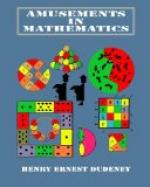There is perhaps no class of puzzle over which people so frequently blunder as that which involves what is called the theory of probabilities. I will give two simple examples of the sort of puzzle I mean. They are really quite easy, and yet many persons are tripped up by them. A friend recently produced five pennies and said to me: “In throwing these five pennies at the same time, what are the chances that at least four of the coins will turn up either all heads or all tails?” His own solution was quite wrong, but the correct answer ought not to be hard to discover. Another person got a wrong answer to the following little puzzle which I heard him propound: “A man placed three sovereigns and one shilling in a bag. How much should be paid for permission to draw one coin from it?” It is, of course, understood that you are as likely to draw any one of the four coins as another.
31.—Domestic economy.
Young Mrs. Perkins, of Putney, writes to me as follows: “I should be very glad if you could give me the answer to a little sum that has been worrying me a good deal lately. Here it is: We have only been married a short time, and now, at the end of two years from the time when we set up housekeeping, my husband tells me that he finds we have spent a third of his yearly income in rent, rates, and taxes, one-half in domestic expenses, and one-ninth in other ways. He has a balance of L190 remaining in the bank. I know this last, because he accidentally left out his pass-book the other day, and I peeped into it. Don’t you think that a husband ought to give his wife his entire confidence in his money matters? Well, I do; and—will you believe it?—he has never told me what his income really is, and I want, very naturally, to find out. Can you tell me what it is from the figures I have given you?”
Yes; the answer can certainly be given from the figures contained in Mrs. Perkins’s letter. And my readers, if not warned, will be practically unanimous in declaring the income to be—something absurdly in excess of the correct answer!
32.—The excursion ticket puzzle.
When the big flaming placards were exhibited at the little provincial railway station, announcing that the Great —— Company would run cheap excursion trains to London for the Christmas holidays, the inhabitants of Mudley-cum-Turmits were in quite a flutter of excitement. Half an hour before the train came in the little booking office was crowded with country passengers, all bent on visiting their friends in the great Metropolis. The booking clerk was unaccustomed to dealing with crowds of such a dimension, and he told me afterwards, while wiping his manly brow, that what caused him so much trouble was the fact that these rustics paid their fares in such a lot of small money.
He said that he had enough farthings to supply a West End draper with change for a week, and a sufficient number of threepenny pieces for the congregations of three parish churches. “That excursion fare,” said he, “is nineteen shillings and ninepence, and I should like to know in just how many different ways it is possible for such an amount to be paid in the current coin of this realm.”




